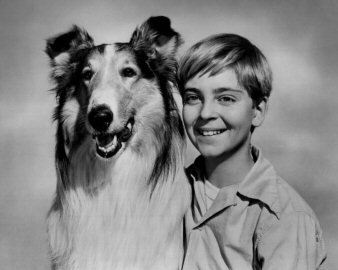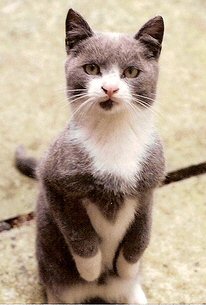Animal Actors: Pets in the Film, TV, and Print Industry
Animals are used for films, television, and print advertising as well as
informational videos made by companies. Animals are represented, just like
models and actors, by animal acting agencies, which make placements for such
companies as AT&T, Wonder Bread, Mercedes Benz, AFLAC, and Target as well as pet
food companies and veterinarian offices.
Types of Animals that are Used for Acting or Commercial Assignments
The actors and models that are used typically go through an involved
prescreening and auditioning process before they are sent out on a job. Besides
dogs and cats, actors may include such animals
 as: as:
- Chickens
- Pigeons
- Rabbits
- Ducks
- Horses
- Sheep
- Cows
- Pigs
- Doves
- Goats
- Mice
- Donkeys
- Parrots
- Canaries
Desired Traits and Attributes
If you want to sign up your dog or cat with an agency, he has to have more
than just classic good looks to succeed. He must also be well-trained and have a
great personality. Therefore, if your dog tends to be nippy or prone to anxiety,
signing him up with an agency is probably not a good idea. Animals that perform
in films or appear in print ads must also be a healthy weight for their breed or
type. Well-socialized and well-trained animals are needed to meet the demands of
the industry.
 That means a dog or cat, for instance, must be able to work around all types
of animals and people. Not only must he possess a good personality then, he
should not be distracted by surrounding movements or sounds. That means a dog or cat, for instance, must be able to work around all types
of animals and people. Not only must he possess a good personality then, he
should not be distracted by surrounding movements or sounds.
Making a Selection
Usually, if a producer is seeking a certain type of animal for his
production, heíll first contact an agency that represents animal performers. For
instance, the producer may want a small poodle or similar type of dog that can
speak or jump when directed. In turn, the agency will send the production
company images or videos of animals they represent along with a listing of each
animalís abilities. Typically, producers will make their choice based first on
the animalís looks followed closely by his skills and background.
Both the Handler and Dog Should be Acclimated to Production-type Environments
As both directors and producers want to produce their creative work with the
least amount of hassle, itís important that the animal and his handler be
acclimated to production-type environments. The better trained an animal is, the
lower the level of frustration and expense for everyone involved.
Commands and Behaviors that a Dog Actor Should Understand and Exhibit
So, if you have a dog, for instance, that you think would make a great actor,
he should be able to understand and perform the following commands or behaviors
off his leash:
- Sit and Stay
- Lay down and Stay
- Come Ė being able to stop or lay down during the command as well
- Hold , carry, or fetch objects
- Go to a specific spot when cued
- Lick when told to do so
- Compliantly wear clothing or accessories without trying to wrestle out
of them
Commands or Behaviors a Cat Should Know or Demonstrate
If you own a cat, he should be trained so he is able to do the following:
- Sit or lay down
- Go, on cue, to a specific spot
- Come when told to do so
- Comfortable being carried or held.
Usually, the above skills are the only behaviors a cat needs to possess.
The following video showcases a day in the life of a cat actor:
Expected Skills for Other Kinds of Pets
Besides the aforementioned skills, animals, again, should be conditioned to
work around commotion and in different locales. Even animals, such as rats,
should be able to go to a certain area when cued or be able to hold their place
while they are chewing. Needless to say, training is imperative if you want to
minimize any problems on a set.
Signing Up with a Pet Acting Agency
Basically, if you sign your pet up with an agency, youíre hiring the company
to find work for the animal. As the industry is pretty competitive and certain
qualifications must be met, work is usually not consistent. However, working
with an agent will enable your pet to obtain more job offerings and establish
himself in the business.
How Much a Pet Can Make
Agencies usually charge a flat rate, like $50, to secure a job and may also
take a small commission out of the money your pet receives. Typically, pets,
such as dogs, earn $50 to $300 per day, depending on the production and whether
theyíre used as extras or as the featured star. Donít expect residual income,
however, if your pet is used in a commercial.
Keep Your Animal Well-Maintained at All Times
Dog and cat maintenance are important if youíre using your canine or feline
in a production. Keep either type of animal looking its best by regular bathing
and grooming.
Sign Up Your Pet Online
If you sign your pet up with an agency or talent management firm, youíll be
considered the petís parent or guardian. You can find agencies listed online
that will represent you and your pet which provide further information about
shooting sites, clients, and actor listings.
Classic Film Stars Ė Animal Actors of the Past
Animal actors that starred in the first films have played a big part in
influencing the use of animals in todayís media. In fact, many classic animal
stars of the past achieved a level of fame that even surpassed the acclaim of
their human co-stars. Some of the most famous of the trailblazing actors
include:
- Rin Tin Tin, the famous German shepherd film star
- Pal, the collie that played Lassie in Lassie Come Home, a 1943
Metro-Goldwyn-Mayer production;
- Morris the Cat (known as Lucky in real life)
- Toto the black Cairn terrier of Wizard of Oz fame (known as Terry
off-screen)
- Roy Rogerís horse, Trigger, whose former name was Golden Cloud before
Rogers renamed him.
Rin Tin Tin
 The famous canine Rin Tin Tin was discovered by American soldier, Lee Duncan,
during the First World War in the remains of an annihilated French kennel. The
soldier took the dog back to Los Angeles where a Hollywood producer, impressed
by the canineís leaping ability, started using him in productions. The dogís
name originates from the name of a popular French puppet called Rintintin. He
also went by the nickname of Rinty too. The famous canine Rin Tin Tin was discovered by American soldier, Lee Duncan,
during the First World War in the remains of an annihilated French kennel. The
soldier took the dog back to Los Angeles where a Hollywood producer, impressed
by the canineís leaping ability, started using him in productions. The dogís
name originates from the name of a popular French puppet called Rintintin. He
also went by the nickname of Rinty too.
Rin Tin Tin, who was featured in 27 motion pictures, regularly received, on
average, about 10,000 pieces of fan mail each week and made a $6,000 per week
salary. In fact, the dog made just a little less than famous actress Greta
Garbo, who brought home $7,000 each week. The original Rin Tin Tin died in 1932
in the arms of movie star Jean Harlow.
The Wizard of Ozís Toto
 Toto, the famous little black terrier from the Wizard of Oz, received a
salary of $125 per week during the production of the 1939 film. Besides working
with Judy Garland in the Oz production, the pooch also worked with such stars as
Spencer Tracy and Shirley Temple too. Toto, the famous little black terrier from the Wizard of Oz, received a
salary of $125 per week during the production of the 1939 film. Besides working
with Judy Garland in the Oz production, the pooch also worked with such stars as
Spencer Tracy and Shirley Temple too.
Morris the Cat
Morris the Cat, known for his finickiness, was discovered by handler Bob
Martwick in 1968 in a Chicago animal shelter. The iconic feline, which was
featured in a number of cat food commercials, was profiled in Mary Danielsí
book, Morris: An Intimate Biography, in 1974.
Lassie of Lassie Come Home (1943 movie)
When trainer Rudd Weatherwax bought Pal, who played Lassie in the motion
picture, Lassie Come Home, he spent lots of time trying to get the
eight-month-old pup not to bark so much. The dog also liked to chase motorcycles
too. While Weatherwax was able to teach Pal not to bark, he still couldnít
control the dog from racing after the motorbikes.
Below is the trailer for the movie:
Roy Rogersí Horse Trigger
 Trigger, Roy Rogerís spirited horse, who was given the name by Rogers for his
intelligence and physical quickness, played Maid Marianís mount in the movie The
Adventures of Robin Hood in 1938. Taxidermy immortalized the horse, which was
placed on display in the Roy Rogers and Dale Evans Museum in Victorville, CA
until it was relocated to a larger gallery in Branson. Trigger, Roy Rogerís spirited horse, who was given the name by Rogers for his
intelligence and physical quickness, played Maid Marianís mount in the movie The
Adventures of Robin Hood in 1938. Taxidermy immortalized the horse, which was
placed on display in the Roy Rogers and Dale Evans Museum in Victorville, CA
until it was relocated to a larger gallery in Branson.
In fact, Trigger was the main reason that tourists visited the museum in
Victorville. When the horse died in 1965, its hide was stretched over a plaster
cast made of the animal. Dale Evanís horse, Buttermilk, was also put on display
as well as Bullet, the German shepherd that the Rogers owned. Rogers rode
Trigger in all the movies that he made.
When the museum was relocated to Branson, Missouri after Roy Rogers and Dale
Evans died, it did not enjoy the same level of success like the museum in
Victorville. After its closure in 2009, Trigger was sold at auction in 2010 to
RFD-TV in Omaha, Nebraska for just over $265,000. He and Bullet were bought by
the station so they could be exhibited in its downtown facility.
Pets
Top Lists:
18 Richest Animals in the World
15 Exotic Pets You Could Own Today
Top 20 Common Substances That Are Toxic to Cats and Dogs
Informational:
Animal Actors: Pets in the Film, TV, and Print Industry
Caring for a Yorkshire Terrier: Facts You Should Know
Caring for a Pig as a Pet: The Pot-bellied Pig and the Micro Pig
Difference Between a Cat Person And a Dog Person
Should You Microchip your Cat or Dog?
How to Raise and Care for Pygmy Goats
Caring for Unique Pets: The Leopard Gecko
Use Food-Grade Diatomaceous Earth to Kill Fleas Naturally
Dogs:
Top Lists:
Top 15 Dog Breeds For Home Protection
15 Fascinating Facts About The Mastiff
Informational:
How To Teach Your Dog to Hunt for Truffles
Caring for an English Bulldog: Tips and Basic Info
Cranial Cruciate Ligament (CCL) Tears in Dogs: Treating the Injury
How To Keep Your Dog free of Heartworm Disease
Dog With Separation Anxiety?
Cats:
Top Lists:
Top 6 Qualities in an Awesome Cat
Informational:
How to Control Fighting Felines
How to Get Your Cat to Exercise
Fish:
Fish 101 for the Hobbyist: The Fishís Body and Senses
Buying a Saltwater Aquarium: What You Need to Know
Graduating to a Saltwater Tank
|